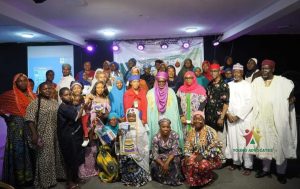The Young Advocates for a Sustainable and Inclusive Future (YASIF) have trained over 2,000 women in six communities in Abuja, the capital of Nigeria, on how to transform plastic waste into shoes, bags, and other household products.

This effort, according to the non-profit organisation, was designed to promote environmental sustainability by significantly reducing plastic garbage in the targeted areas, namely Karonmajiji, Durunmi, Galadimawa, Jahi, Abaji, and Paiko.
Following the successful conclusion of this life-changing programme, the beneficiaries, the majority of whom are young people, are expected to apply their newly learnt skills to contribute to the country’s socioeconomic growth through innovative waste management and upcycling techniques. They will also act as ambassadors in their local communities, advocating behavioural change and encouraging community involvement in environmental stewardship.
Speaking at the capacity building programme’s closing ceremony in Abuja on Wednesday, August 28, 2024, Blessing Ewa, the founder of YASIF, hinted that the initiative, titled Waste Free Community Project, began in 2022 by sensitising local communities about sustainable plastic management.
So, after successfully teaching people about the value of plastic waste, Ewah – who expressed her happiness over the accomplishments the programme has recorded since its inception – said that they then decided to train and empower them in upcycling to help women and youths use plastics to make finished products that they can sell and make money.
“It is our way of engaging them to help promote the economy,” she said, pointing to the closing ceremony, which allowed the beneficiaries from the various communities to showcase everything they had accomplished during their training.
In line with YASIF’s objective of changing the public’s perception of plastics as waste, the environmental rights advocate expounded that this belief informed her group’s first call to action of letting people know that these things have value, which is what “we have been doing over the years.”
When asked about how she and her team intend to spread the initiative beyond Abuja, Ewa summarised that the project’s overall goal is to help grassroots communities develop a climate-conscious mindset.
“Our aim is to ensure that we visit as many grassroots communities as possible across Nigeria, helping them to know the value in plastics and empowering them to take up initiatives that promote the circular economy,” she stated.
The project, according to Mrs. Falmata Bukar-kolo, a deputy director in the Federal Ministry of Environment’s Solid Waste Management department, is in line with the government’s intervention programme, which was designed to empower women and youth through waste entrepreneurship. She added that it also addresses the issues preventing proper waste management through value addition and foster private sector involvement in the waste management value chain.
Waste management, Bukar-kolo went on to explain, has been a major problem in the country ever since the post-independence era. According to her, the volume and complexity of refuse generation have continuously increased over this time.
This, she elaborated, is because the increase in socio-economic development, industrialisation, and technological advancements, which resulted in urban drift and pollution explosion, was never accompanied by adequate plans and infrastructural facilities to effectively accommodate the sudden changes.
In light of this, the ministry’s representative bemoaned the fact that these enormous modifications were nevertheless responsible for the creation, buildup, and obstruction of debris, which has now overtaken the nation’s drainage systems and occupied a larger portion of the cities’ streets.
“We are calling for a massive campaign of civic action,” she said, to promote the principles and practices of circular economy.
HRH Yunusa Abdullahi, District Head of Karonmajiji, one of the communities that benefitted from the programme, thanked YASIF for its thoughtfulness in helping to empower his people. According to him, this action will go a long way towards reducing social vices, especially among the youths in the area.
Therefore, he called on the government at all levels to support YASIF in what it’s doing to expand its work beyond the capital city to other parts of the country.
By Etta Michael Bisong, Abuja
